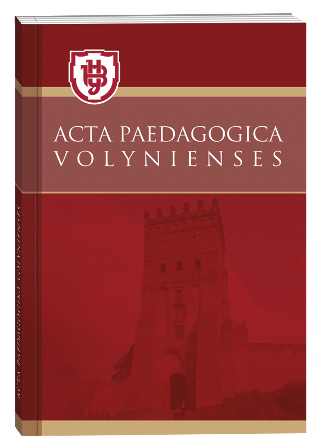EFFICIENT APPROACHES TO TEACHING ENGLISH VOCABULARY TO FUTURE JOURNALISTS IN THE CONTEXT OF THEIR PROFESSIONAL TRAINING
DOI:
https://doi.org/10.32782/apv/2024.1.15Keywords:
English vocabulary teaching, professional training of journalists, English for special purposes, approaches to teaching vocabulary, stages of teaching vocabulary.Abstract
The article highlights the problem of the defining and substantiation of efficient approaches to teaching English vocabulary to future journalists in the English language process being an integral part of their professional training. Thus, the author substantiates the theoretical basics and practical conditions for the efficient methods of teaching English vocabulary to students, including special professional vocabulary and terminology. The author suggests the use of various types of reading general, academic and professional literature for the enrichment of passive vocabulary; states the reasons for the introduction of students to the lexical units such as cultural realia, proper and geographical names etc., which could present substantial pronunciation difficulties for students. It is acknowledged that it would be reasonable to create a basic terminological glossary, which would reflect the specifics of the profession whereas stylistically neutral lexical units should still be employed for everyday and professional usage. It is also suggested that communicative tasks and exercises should be developed for the use of vocabulary in a professional context to reinforce its efficient memorization and better realization of grammatical behavior of corresponding vocabulary units. In order to prepare future journalists for professional writing, it is argued that it is necessary to employ pre-communicative exercises, which aim at learning orthographical word forms. The author confirms the advisability of organization of stage-by stage mastering English vocabulary, the selection of various types of exercises, including communicative ones and those modelling themselves on the base of problems. The article emphasizes that it is necessary to take into account the linguistic and stylistic specifics of teaching materials and information resources, including those connected with digital and printed media. Lastly, the article substantiates test control for combined comprehension check and assessment of grammar, vocabulary and communicative skills providing the compliance with the general principles of objective testing.
References
Побірченко Н. С. (2012). Компетентнісний підхід у вищій школі: теоретичний аспект. Освіта та педагогічна наука. №3 (152). 24-30. http://www.irbis-nbuv.gov.ua/cgi-bin/irbis_nbuv/cgiirbis_64.exe?I21DBN=LINK&P21DBN=U JRN&Z21ID=&S21REF=10&S21CNR=20&S21STN=1&S21FMT=ASP_meta&C21COM=S&2_S21P03=FILA=&2_S21STR=OsDon_2012_3_5
Бакаєва Г.Є, Борисенко О.А, Зуєнок І.І. та інші. (2005). Програма з англійської мови для професійного спілкування. National ESP Curriculum. Колектив авторів: Київ. Ленвіт. 119. https://im.nmu.org.ua/ua/library/national_esp_curriculum.pdf
Drummond A. (2018). Investigating the Relationship between IELTS Scores and Receptive Vocabulary Size. King’s College London. Journal of the Foundation Year Network. Volume 1. 113-125. https://jfyn.co.uk/index.php/ukfyn/article/view/13/23
Thornburry S. (2002). How to teach vocabulary. Pearson education limited. 185.
Nation I. (2009). Teaching ESL/EFL Reading and Writing. London and New York. Routledge. 171.
Хорошун О.О. (2014). Дискурс засобів масової інформації: характерні особливості. Вісник Луганського національного університету імені Тараса Шевченка. Філологічні науки (6). 160-163. http://www.irbis-nbuv.gov.ua/cgi-bin/irbis_nbuv/cgiirbis_64.exe?I21DBN=LINK&P21DBN=UJRN&Z21ID=&S21REF=10&S21CNR=20&S21STN=1&S21FMT=ASP_meta&C21COM=S&2_S21P03=FILA=&2_S21STR=vluf_2014_6%282%29__12
Гарматюк Н.Д, Марценюк В.П. (2013). Особливості застосування тестового контролю при вивченні іноземної мови у вищих навчальних закладах. Медична освіта. №3. 17-24. http://www.irbis-nbuv.gov.ua/cgi-bin/irbis_nbuv/cgiirbis_64.exe?I21DBN=LINK&P21DBN=UJRN&Z21ID=&S21REF=10&S21CNR=20&S21STN=1&S21FMT=ASP_meta&C21COM=S&2_S21P03=FILA=&2_S21STR=Mosv_2013_3_6







